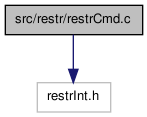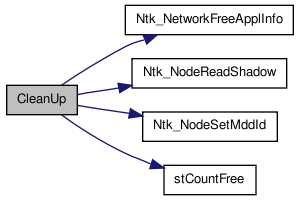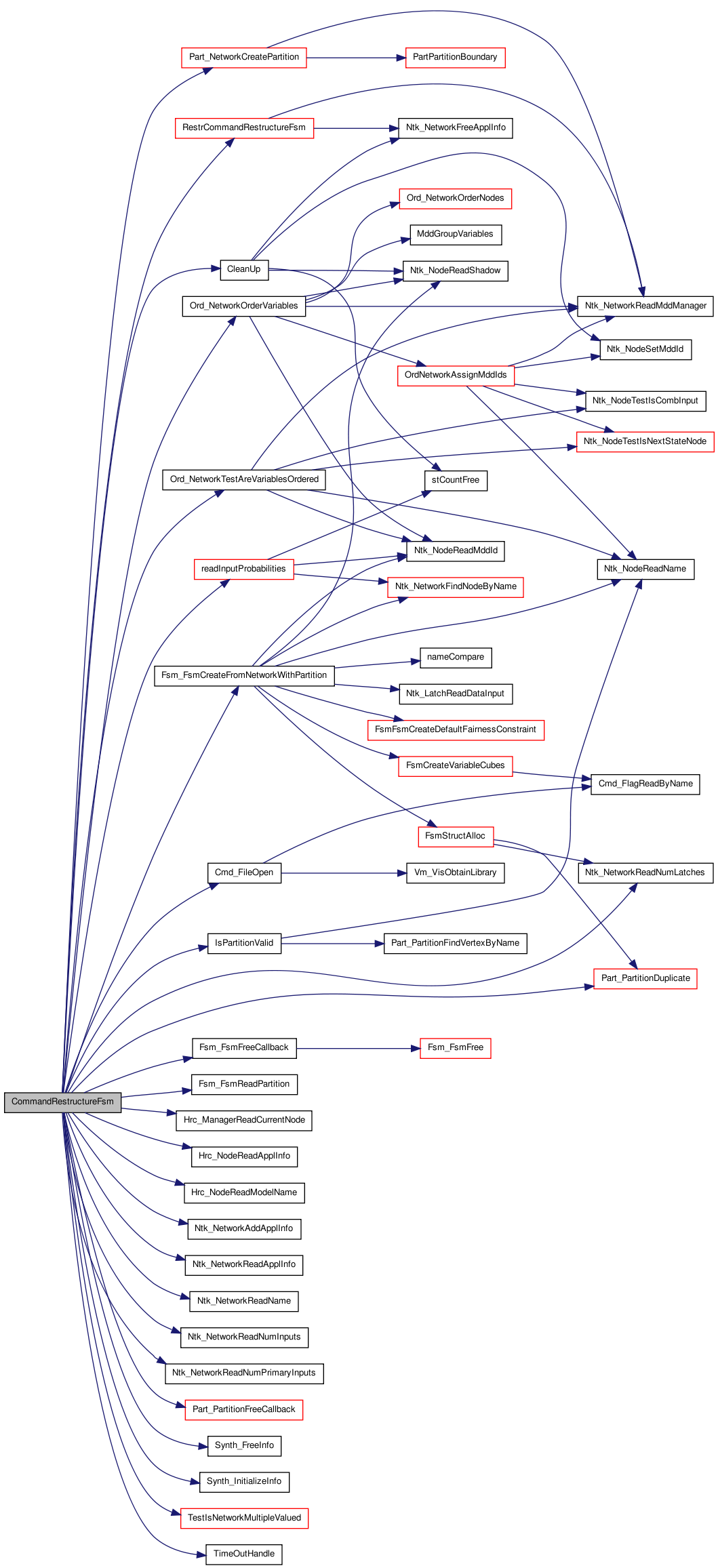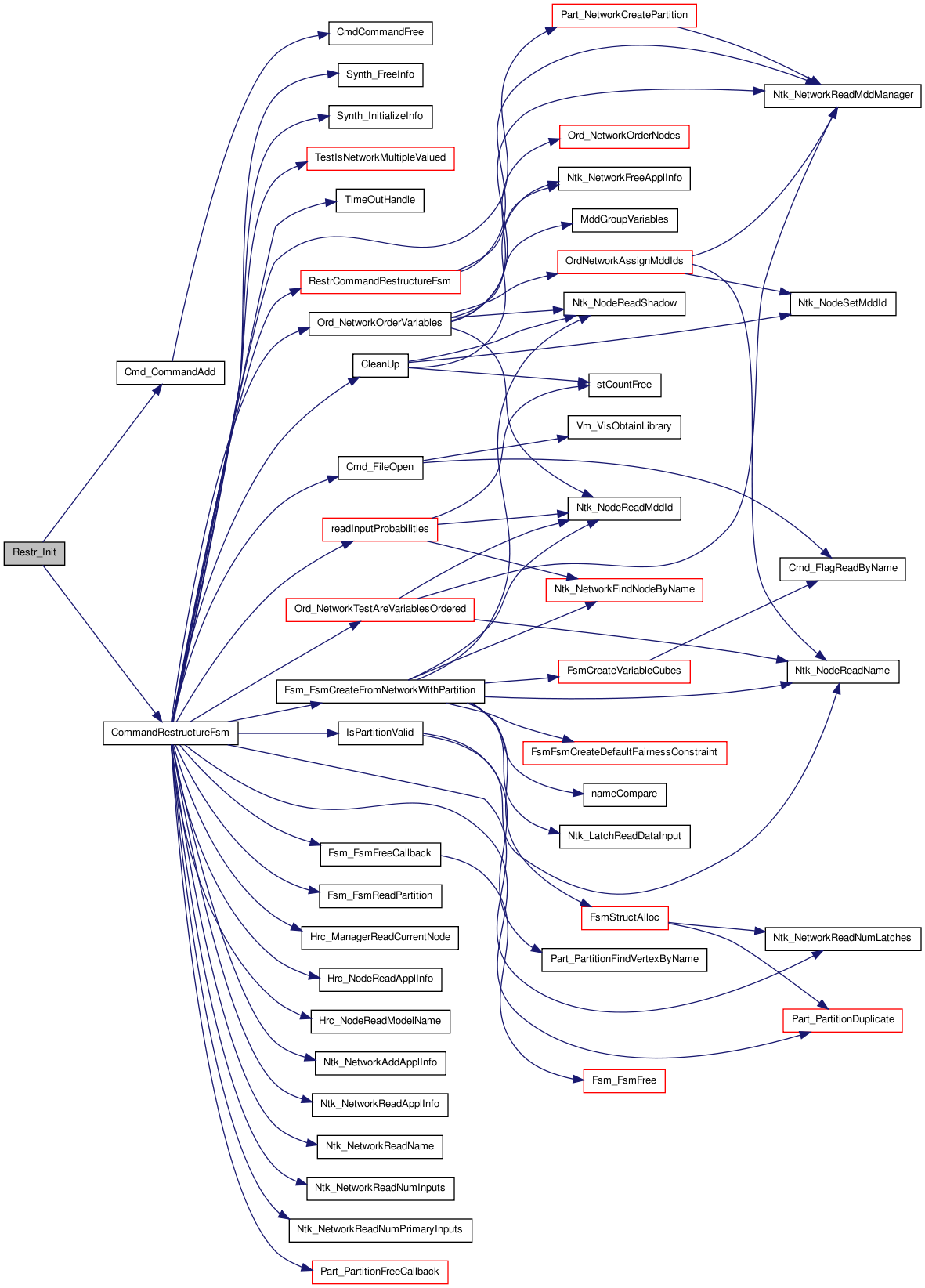#include "restrInt.h" Include dependency graph for restrCmd.c:
Include dependency graph for restrCmd.c:Go to the source code of this file.
Functions | |
| static int | CommandRestructureFsm (Hrc_Manager_t **hmgr, int argc, char **argv) |
| static void | TimeOutHandle (void) |
| static st_table * | readInputProbabilities (Ntk_Network_t *network, FILE *fp) |
| static void | CleanUp (Ntk_Network_t *network1, st_table *inputProb, char *outOrderFileName, char *dumpFileName, char *prefix, int varOrdered, int restrCreatedPart, int restrCreatedFsm, char *probFile) |
| static enum st_retval | stCountFree (char *key, char *value, char *arg) |
| static int | IsPartitionValid (Ntk_Network_t *network, graph_t *partition) |
| static int | TestIsNetworkMultipleValued (Ntk_Network_t *network) |
| void | Restr_Init (void) |
| void | Restr_End (void) |
Variables | |
| static jmp_buf | timeOutEnv |
| int | restrCreatedPart |
| int | restrCreatedFsm |
| boolean | restrVerbose |
Function Documentation
| static void CleanUp | ( | Ntk_Network_t * | network1, |
| st_table * | inputProb, | ||
| char * | outOrderFileName, | ||
| char * | dumpFileName, | ||
| char * | prefix, | ||
| int | varOrdered, | ||
| int | restrCreatedPart, | ||
| int | restrCreatedFsm, | ||
| char * | probFile | ||
| ) | [static] |
Function********************************************************************
Synopsis [Free memory at the end of the task.]
Description [Free memory at the end of the task.]
SideEffects [None]
SeeAlso []
Definition at line 757 of file restrCmd.c.
{
Ntk_Node_t *node;
lsGen gen;
if (inputProb) {
st_foreach(inputProb,stCountFree,NIL(char));
st_free_table(inputProb);
}
if (outOrderFileName)
FREE(outOrderFileName);
if (dumpFileName)
FREE(dumpFileName);
if (prefix)
FREE(prefix);
if (probFile)
FREE(probFile);
/* Set the mdd id's for all the primary inputs, latches and next
* state nodes to UNASSIGNED if it was specifically set in this
* routine.
*/
if (varOrdered) {
Ntk_NetworkForEachPrimaryInput(network1,gen,node) {
Ntk_NodeSetMddId(node,NTK_UNASSIGNED_MDD_ID);
}
Ntk_NetworkForEachLatch(network1,gen,node) {
Ntk_Node_t *shadow;
shadow = Ntk_NodeReadShadow(node);
Ntk_NodeSetMddId(node,NTK_UNASSIGNED_MDD_ID);
Ntk_NodeSetMddId(shadow,NTK_UNASSIGNED_MDD_ID);
}
}
/* Delete the partition hooked to the network if it was created in
* this routine.
*/
if (restrCreatedPart) {
Ntk_NetworkFreeApplInfo(network1,RESTR_PART_NETWORK_APPL_KEY);
}
/* Delete the FSM hooked to the network if it was created in
* this routine.
*/
if (restrCreatedFsm) {
Ntk_NetworkFreeApplInfo(network1,RESTR_FSM_NETWORK_APPL_KEY);
}
}
 Here is the call graph for this function:
Here is the call graph for this function: Here is the caller graph for this function:
Here is the caller graph for this function:| static int CommandRestructureFsm | ( | Hrc_Manager_t ** | hmgr, |
| int | argc, | ||
| char ** | argv | ||
| ) | [static] |
AutomaticStart
Function********************************************************************
Synopsis [Implements the restruct_fsm command.]
Description [This command implements an State Transition Graph (STG) restructuring algorithm that exploits the existence of equivalent states to decrease power dissipation, not necessarily by collapsing the equivalence states, but by redirecting transitions in the graph. This algorithm is based on the monolithic transition relation. The complexity of the algorithm in general increases with an increase in the size of the state transition graph, which depends on the number of state variables and primary inputs. For more details see, "A Symbolic Algorithm for Low-Power Sequential Synthesis", ISLPED 97.]
SideEffects [None]
SeeAlso []
CommandName [restruct_fsm]
CommandSynopsis [Restructre the STG of a finite state machine to reduce power dissipation.]
CommandArguments [\[-D <fileHead>\] \[-d <divMethod>\] \[-E\] \[-F <factMethod>\] \[-f <probFile>\] \[-h\] \[-N\] \[-o <orderFile>\] \[-p <string>\] \[-s <restrMethod>\] \[-t <seconds>\] \[-v\]]
CommandDescription [This command implements an STG restructuring algorithm that exploits the existence of equivalent states to decrease power dissipation, not necessarily by collapsing the equivalence states, but by redirecting transitions in the state transition graph (STG). This algorithm is based on monolithic transition relation. The complexity of the algorithm in general increases with an increase in the size of the STG. The number of states and edges in the STG are exponential in the number of state variables and primary inputs. The memory utilization is not necessarily exponential due to symbolic representation of the STG. For more details see, "A Symbolic Algorithm for Low-Power Sequential Synthesis", ISLPED 97.
This command works only if VIS is compiled with CUDD package. The algorithm can handle circuits described in both BLIF and BLIF-MV format. However, multi-valued variables are not supported. Also, the final synthesized circuit (network implementation of the restructured STG) is available only in BLIF format. The sequential circuit should have a single initial state.
A network should have been created for the circuit and its primary inputs and state variables assigned BDD ids prior to the invocation of this command. A network can be created by the command flatten_hierarchy and command static_order assigns BDD ids to the input and state variables. The command proceeds by creating BDDs for the outputs and next state functions. An FSM data structure is then created on which subsequent operations are performed. After the STG is restructured a new circuit is synthesized by symbolic factorization based on Zero-Suppressed Decision Diagrams (ZDDs). The final synthesized circuit is a file in BLIF format with ".ml.blif" as the extension.
The typical command flow in vis is the following:
vis> read_blif foo.blif
vis> flatten_hierarchy
vis> static_order
vis> dynamic_var_ordering -e sift
vis> restruct_fsm
In the above case example, the final synthesized circuit is MODEL.ml.blif if the name of the design in foo.blif is MODEL.
Command options:
- -A
Allow realignment (during symbolic factorization) of ZDDs after BDD reordering and vice versa. This option is effective when only one of the BDD or ZDD variable reordering is enabled.
- -D <fileHead>
Specify the output file name for synthesized circuit. File extension is not necessary. By default, the model name of the circuit is used. For example, -D foobar, will result in foobar.ml.blif
- -d <divMethod>
Choose a divisor. See
synthesize_networkfor more details.- -E
Print the number of equivalence classes in the FSM.
- -F <probFile>
File with primary input probabilities, one per line.
input_name<probability>- -f <factMethod>
Choose a method for factorization. See
synthesize_networkfor more details.- -h
Print command usage.
- -i <string>
Specify the prefix to be used to generate names for internal nodes during synthesis. By default, the prefix is "_n".
- -N
Expand the reachable set R to include those states which are equivalent to R but not reachable. The default is not to include such states.
- -o <orderFile>
File to output BDD variable ordering after the restructured circuit is synthesized.
- -R <value>
Allow reordering in BDD and/or ZDD variables during symbolic factorization stage.
0 : (default) No reordering neither in BDD nor in ZDD.
1 : Allows reordering only in BDD, not in ZDD.
2 : Allows reordering only in ZDD, not in BDD.
3 : Allows reordering both in BDD and in ZDD.
- -s <heuristic>
Heuristic to perform restructuring. Consider a fragment of an STG containing states A,B and C and an edge from A to B. Let B and C be equivalent. Since B and C are equivalent, it is possible to change the transition between A and B to A and C. In the more general case, the choice can be driven by different cost constraints. The following are the heuristics:
ham : Hamming distance based heuristic. An edge is chosen that reduces the Hamming distance (or state bit transitions) between the states.
fanin : Fanin oriented heuristic. A representative from the equivalence class is chosen that reduces the total average state bit switching on the incoming edges.
faninout : Fanin-Fanout oriented heuristic. A representative from the equivalence class is chosen that reduces the total average state bit switching on the incoming as well as outgoing edges.
cproj : A simple C-Projection. A representative from the equivalence class is chosen which is closest to the initial state. The distance d(x,y) is defined as:
{i=0}^{N-1}(|x_i - y_i| 2^{N-i-1}).- -T
Try to share more nodes during symbolic factorization. Existing divisors are checked for potential reuse before extracting divisors from the current boolean function.
- -t <seconds>
Time in seconds allowed to complete the command. If the computation time goes above that limit, the process is aborted. The default is no limit.
- -v
Turn on verbosity.
- See also command : synthesize_network
]
SideEffects [Package specific information is stored in the network and cleared at the end.]
SeeAlso []
Definition at line 280 of file restrCmd.c.
{
graph_t *partition = NIL(graph_t);
Fsm_Fsm_t *fsm = NIL(Fsm_Fsm_t);
Ntk_Network_t *network1 = NIL(Ntk_Network_t);
Hrc_Node_t *currentNode = NIL(Hrc_Node_t);
lsList dummy = (lsList) 0;
char *modelName,*str;
int timeOutPeriod;
boolean status;
int c;
long initialTime, finalTime;
RestructureHeuristic heuristic;
boolean equivClasses, nonReachEquiv;
boolean eqvMethod;
int varOrdered;
char *outOrderFileName,*blifName;
char *dumpFileName,*probFile;
int reorder,trySharing,realign;
FILE *fp;
st_table *inputProb = NULL;
/* Synthesis related options */
Synth_InfoData_t *synthInfo;
int factoring, divisor;
char *prefix;
if (bdd_get_package_name() != CUDD) {
(void) fprintf(vis_stderr,
"** restr error: The restr package can be used only with CUDD package\n");
(void) fprintf(vis_stderr,"** restr error: Please link with CUDD package\n");
return 0;
}
/* These are the default values. */
timeOutPeriod = 0;
status = FALSE;
restrVerbose = 0;
equivClasses = 0;
nonReachEquiv = 0;
eqvMethod = 0;
heuristic = RestrHammingD_c;
fp = NIL(FILE);
outOrderFileName = NIL(char);
dumpFileName = NIL(char);
probFile = NIL(char);
restrCreatedPart = 0;
restrCreatedFsm = 0;
varOrdered = 0;
/* Synthesis related default values */
factoring = 0;
divisor = 1;
prefix = NIL(char);
reorder = 0;
trySharing = 0;
realign = 0;
util_getopt_reset();
while((c = util_getopt(argc, argv, "f:d:i:EeNvD:o:t:s:F:R:TAh")) != EOF) {
switch(c) {
case 'f':
factoring = atoi(util_optarg);
break;
case 'd':
divisor = atoi(util_optarg);
break;
case 'i':
prefix = util_strsav(util_optarg);
break;
case 'E':
equivClasses = 1;
break;
case 'e':
eqvMethod = 1;
break;
case 'N':
nonReachEquiv = 1;
break;
case 'v':
restrVerbose = 1;
break;
case 'D':
dumpFileName = util_strsav(util_optarg);
break;
case 'o':
outOrderFileName = util_strsav(util_optarg);
/* Check if the file specified to dump variable order already exists */
fp = Cmd_FileOpen(outOrderFileName,"r",NIL(char *),1);
if (fp) {
(void) fprintf(vis_stderr,"** restr error: Output order file %s already exists.\n",
outOrderFileName);
(void) fprintf(vis_stderr,"** restr error: Please specify another name.\n");
fclose(fp);
FREE(outOrderFileName);
goto endgame;
}
break;
case 't':
timeOutPeriod = atoi(util_optarg);
break;
case 's':
str = util_strsav(util_optarg);
if (strcmp(str,"ham") == 0) {
heuristic = RestrHammingD_c;
} else if (strcmp(str,"fanin") == 0) {
heuristic = RestrFanin_c;
} else if (strcmp(str,"faninout") == 0) {
heuristic = RestrFaninFanout_c;
} else if (strcmp(str,"cproj") == 0) {
heuristic = RestrCProjection_c;
} else {
(void) fprintf(vis_stderr,"** restr warning: Invalid option %s\n",str);
(void) fprintf(vis_stderr,"** restr warning: Using Hamming distance heuristic\n\n");
heuristic = RestrHammingD_c;
}
FREE(str);
break;
case 'F':
probFile = util_strsav(util_optarg);
fp = Cmd_FileOpen(probFile,"r",NIL(char *),1);
if (!fp) {
fprintf(vis_stderr,"** restr warning: Cannot open %s \n",probFile);
fprintf(vis_stderr,"** restr warning: Assuming equi probable primary inputs\n");
FREE(probFile);
probFile = NIL(char);
} else {
fclose(fp);
}
break;
case 'R':
/* Option to enable/disable reordering during synthesis
(factorization) stage */
reorder = atoi(util_optarg);
break;
case 'T':
/* During factorization maximize sharing of nodes */
trySharing = 1;
break;
case 'A':
/* Realign ZDD variables after BDD variable reordering and vice
versa */
realign = 1;
break;
case 'h':
goto usage;
default:
goto usage;
}
}
if(Hrc_ManagerReadCurrentNode(*hmgr) == NIL(Hrc_Node_t)) {
(void) fprintf(vis_stderr,"** restr error: The hierarchy manager is empty.");
(void) fprintf(vis_stderr," Read in design.\n");
goto endgame;
}
network1 = (Ntk_Network_t *)
Hrc_NodeReadApplInfo(Hrc_ManagerReadCurrentNode(*hmgr),
NTK_HRC_NODE_APPL_KEY);
if(network1 == NIL(Ntk_Network_t)) {
(void) fprintf(vis_stderr,"** restr error: There is no network. ");
(void) fprintf(vis_stderr,"Use flatten_hierarchy.\n");
goto endgame;
}
if(!Ntk_NetworkReadNumLatches(network1)) {
(void) fprintf(vis_stderr,"**restr error: No latches present in the ");
(void) fprintf(vis_stderr,"current network.\n");
(void) fprintf(vis_stderr,"** restr error: This algorithm does not apply.\n");
goto endgame;
}
/* Check if the current network has signals with multiple values. */
if (TestIsNetworkMultipleValued(network1)) {
(void) fprintf(vis_stderr,"** restr error: Circuit has multiple valued variables.\n");
(void) fprintf(vis_stderr,"** restr error: This algorithm applies to boolean signals only.\n");
goto endgame;
}
if(Ntk_NetworkReadNumPrimaryInputs(network1) !=
Ntk_NetworkReadNumInputs(network1)) {
(void) fprintf(vis_stderr,"** restr error: Pseudo inputs present in the network.\n");
(void) fprintf(vis_stderr,"** restr error: This algorithm does not apply.\n");
goto endgame;
}
if (!dumpFileName)
dumpFileName = util_strsav(Ntk_NetworkReadName(network1));
/* Check if the output blif file already exists */
blifName = util_strcat3(dumpFileName,".ml.blif","");
fp = Cmd_FileOpen(blifName,"r",NIL(char *),1);
if (fp) {
(void) fprintf(vis_stderr,"** restr error: Output blif file %s already exists.\n",
blifName);
(void) fprintf(vis_stderr,"** restr error: Please specify another name.\n");
fclose(fp);
FREE(blifName);
goto endgame;
}
FREE(blifName);
/* Check if the network has the variables ordered */
if (Ord_NetworkTestAreVariablesOrdered(network1, Ord_InputAndLatch_c) ==
FALSE) {
Ord_NetworkOrderVariables(network1,Ord_RootsByDefault_c,
Ord_NodesByDefault_c, FALSE,
Ord_InputAndLatch_c,Ord_Unassigned_c,
dummy,0);
varOrdered = 1;
}
/* If primary input probabilities are specified, read them */
if (probFile) {
fp = Cmd_FileOpen(probFile,"r",NIL(char *),1);
inputProb = readInputProbabilities(network1,fp);
fclose(fp);
FREE(probFile);
fp = NIL(FILE);
}
/* Check if there is an FSM already attached to the network */
fsm = (Fsm_Fsm_t *) Ntk_NetworkReadApplInfo(network1,
FSM_NETWORK_APPL_KEY);
if (fsm == NIL(Fsm_Fsm_t)) {
partition = (graph_t *) Ntk_NetworkReadApplInfo(network1,
PART_NETWORK_APPL_KEY);
/* If there is none then create one. */
if (partition == NIL(graph_t) ||
(!IsPartitionValid(network1,partition))) {
currentNode = Hrc_ManagerReadCurrentNode(*hmgr);
modelName = Hrc_NodeReadModelName(currentNode);
partition = Part_NetworkCreatePartition(network1, currentNode,
modelName, (lsList) 0,
(lsList) 0, NIL(mdd_t),
Part_InOut_c, (lsList) 0,
FALSE, FALSE, TRUE);
Ntk_NetworkAddApplInfo(network1, RESTR_PART_NETWORK_APPL_KEY,
(Ntk_ApplInfoFreeFn) Part_PartitionFreeCallback,
(void *) partition);
restrCreatedPart = 1;
}
fsm = Fsm_FsmCreateFromNetworkWithPartition(network1,
Part_PartitionDuplicate(partition));
if (fsm == NIL(Fsm_Fsm_t)) {
(void) fprintf(vis_stderr,"** restr error: Could not create ");
(void) fprintf(vis_stderr,"an Fsm\n");
goto endgame;
}
Ntk_NetworkAddApplInfo(network1, RESTR_FSM_NETWORK_APPL_KEY,
(Ntk_ApplInfoFreeFn) Fsm_FsmFreeCallback,
(void *) fsm);
restrCreatedFsm = 1;
} else {
partition = (graph_t *) Fsm_FsmReadPartition(fsm);
if (partition == NIL(graph_t) ||
(!IsPartitionValid(network1,partition))) {
currentNode = Hrc_ManagerReadCurrentNode(*hmgr);
modelName = Hrc_NodeReadModelName(currentNode);
partition = Part_NetworkCreatePartition(network1, currentNode,
modelName, (lsList) 0,
(lsList) 0, NIL(mdd_t),
Part_InOut_c, (lsList) 0,
FALSE, FALSE, TRUE);
Ntk_NetworkAddApplInfo(network1, RESTR_PART_NETWORK_APPL_KEY,
(Ntk_ApplInfoFreeFn) Part_PartitionFreeCallback,
(void *) partition);
restrCreatedPart = 1;
fsm = Fsm_FsmCreateFromNetworkWithPartition(network1,
Part_PartitionDuplicate(partition));
if (fsm == NIL(Fsm_Fsm_t)) {
(void) fprintf(vis_stderr,"** restr error: Could not create ");
(void) fprintf(vis_stderr,"an Fsm\n");
goto endgame;
}
Ntk_NetworkAddApplInfo(network1, RESTR_FSM_NETWORK_APPL_KEY,
(Ntk_ApplInfoFreeFn) Fsm_FsmFreeCallback,
(void *) fsm);
restrCreatedFsm = 1;
}
}
/* Start the timer before calling restruct. */
if (timeOutPeriod > 0){
(void) signal(SIGALRM, (void(*)(int))TimeOutHandle);
(void) alarm(timeOutPeriod);
if (setjmp(timeOutEnv) > 0) {
(void) fprintf(vis_stderr, "** restr warning: Timeout occurred after ");
(void) fprintf(vis_stderr, "%d seconds.\n", timeOutPeriod);
alarm(0);
goto endgame;
}
}
/* Prepare the data structure for the synthesis package */
synthInfo = Synth_InitializeInfo(factoring,divisor,0,
reorder,trySharing,realign,
dumpFileName,prefix,0);
initialTime = util_cpu_time();
status = RestrCommandRestructureFsm(fsm, heuristic,outOrderFileName,
equivClasses,nonReachEquiv,
eqvMethod,inputProb,synthInfo);
finalTime = util_cpu_time();
if(status) {
(void) fprintf(vis_stdout, "%-20s%10ld\n", "RESTR: analysis time =",
(finalTime-initialTime)/1000);
}
else {
(void) fprintf(vis_stdout, "** restr error: Could not restructure successfully.\n");
}
if (synthInfo)
Synth_FreeInfo(synthInfo);
/* Clean up */
CleanUp(network1,inputProb,outOrderFileName,dumpFileName,prefix,
varOrdered,restrCreatedPart,restrCreatedFsm,probFile);
alarm(0);
return 0; /* normal exit */
endgame:
/* Clean up */
CleanUp(network1,inputProb,outOrderFileName,dumpFileName,prefix,
varOrdered,restrCreatedPart,restrCreatedFsm,probFile);
return 1; /* Error exit */
usage:
if (outOrderFileName)
FREE(outOrderFileName);
if (dumpFileName)
FREE(dumpFileName);
if (prefix)
FREE(prefix);
if (probFile)
FREE(probFile);
(void) fprintf(vis_stderr, "\nusage: Also see help restruct_fsm for more details.\n\n");
(void) fprintf(vis_stderr, " -A \t\tAllow realignment--during symbolic factorization--of BDD\n");
(void) fprintf(vis_stderr, " \t\tand ZDD variables after reordering.\n\n");
(void) fprintf(vis_stderr, " -D <fileHead>\tOutput file name for synthesized circuit.\n");
(void) fprintf(vis_stderr, " \t\tDefault: model_name.ml.blif\n\n");
(void) fprintf(vis_stderr, " -d <divMethod>\tChoose a divisor during synthesis. See\n");
(void) fprintf(vis_stderr, " \t\tsynthesize_network command for more details.\n");
(void) fprintf(vis_stderr, " \t\t0 : Fast divisor\n");
(void) fprintf(vis_stderr, " \t\t1 : Least occuring literal divisor (default)\n");
(void) fprintf(vis_stderr, " \t\t2 : Most occuring literal divisor\n");
(void) fprintf(vis_stderr, " \t\t3 : Level-0 kernel divisor\n\n");
(void) fprintf(vis_stderr, " -E \t\tPrint the number of equivalence classes in the STG.\n\n");
(void) fprintf(vis_stderr, " -F <probFile>\tInput file with PI probabilities, one per line.\n\n");
(void) fprintf(vis_stderr, " -f <factMethod>\tChoose a factorization method. See synthesize_network\n");
(void) fprintf(vis_stderr, " \t\tfor more details.\n");
(void) fprintf(vis_stderr, " \t\t0 : Simple factoring (default)\n");
(void) fprintf(vis_stderr, " \t\t1 : Generic factoring\n\n");
(void) fprintf(vis_stderr, " -h \t\tPrint command usage.\n\n");
(void) fprintf(vis_stderr, " -i <name>\t\tPrefix to be used to generate names for internal\n");
(void) fprintf(vis_stderr, " \t\tnodes during synthesis. Default: \"_n\"\n\n");
(void) fprintf(vis_stderr, " -N \t\tExpand the reachable set R to include those states\n");
(void) fprintf(vis_stderr, " \t\twhich are equivalent to R but unreachable.\n");
(void) fprintf(vis_stderr, " \t\tThe default is not to include.\n\n");
(void) fprintf(vis_stderr, " -o <orderFile>\tFile to output BDD variable order at the end.\n\n");
(void) fprintf(vis_stderr, " -R <value>\t\tSet reordering (0-3)\n");
(void) fprintf(vis_stderr, " \t\t0 : no reordering (default)\n");
(void) fprintf(vis_stderr, " \t\t1 : reordering in only BDD\n");
(void) fprintf(vis_stderr, " \t\t2 : reordering on only ZDD\n");
(void) fprintf(vis_stderr, " \t\t3 : reordering on both\n\n");
(void) fprintf(vis_stderr, " -s <heuristic>\tHeuristic to perform restructuring.\n");
(void) fprintf(vis_stderr, " \t\tType help restruct_fsm for more details on each option.\n");
(void) fprintf(vis_stderr, " \t\tham : Hamming distance based heuristic. (Default)\n");
(void) fprintf(vis_stderr, " \t\tfanin : Fanin oriented heuristic.\n");
(void) fprintf(vis_stderr, " \t\tfaninout : Fanin-Fanout oriented heuristic.\n");
(void) fprintf(vis_stderr, " \t\tcproj : C-Projection based heuristic.\n\n");
(void) fprintf(vis_stderr, " -T \t\tTry to share mode nodes during symbolic factorization.\n\n");
(void) fprintf(vis_stderr, " -t <seconds>\tTime in seconds to complete the command. The command\n");
(void) fprintf(vis_stderr, " \t\tis aborted if computation time goes above this limit.\n\n");
(void) fprintf(vis_stderr, " -v \t\tTurn on verbosity.\n");
return 1; /* error exit */
}
 Here is the call graph for this function:
Here is the call graph for this function: Here is the caller graph for this function:
Here is the caller graph for this function:| static int IsPartitionValid | ( | Ntk_Network_t * | network, |
| graph_t * | partition | ||
| ) | [static] |
Function********************************************************************
Synopsis [Checks whether partition is valid.]
Description [Checks whether partition is valid. The condition is that the given partition should have a vertex for each combinational output (PO and NS) and combinational input (PI and PS) of the network.]
SideEffects [None]
SeeAlso []
Definition at line 854 of file restrCmd.c.
{
Ntk_Node_t *node;
lsGen gen;
char *name;
Ntk_NetworkForEachCombOutput(network, gen, node) {
name = Ntk_NodeReadName(node);
if(Part_PartitionFindVertexByName(partition, name) == NIL(vertex_t)) {
return(0);
}
}
Ntk_NetworkForEachCombInput(network, gen, node) {
name = Ntk_NodeReadName(node);
if(Part_PartitionFindVertexByName(partition, name) == NIL(vertex_t)) {
return(0);
}
}
return 1;
}
 Here is the call graph for this function:
Here is the call graph for this function: Here is the caller graph for this function:
Here is the caller graph for this function:| static st_table * readInputProbabilities | ( | Ntk_Network_t * | network, |
| FILE * | fp | ||
| ) | [static] |
Function********************************************************************
Synopsis [Reads the input probabilities of primary inputs.]
Description [Reads the input probabilities of primary inputs.]
SideEffects [None]
SeeAlso []
Definition at line 701 of file restrCmd.c.
{
Ntk_Node_t *node;
char name[MAX_NAME_LEN];
double value;
double *valuePtr;
st_table *inputProb;
inputProb = st_init_table(st_numcmp,st_numhash);
while (fscanf(fp, "%s %lf\n", name, &value) != EOF) {
node = Ntk_NetworkFindNodeByName(network,name);
if (node == NIL(Ntk_Node_t)) {
(void) fprintf(vis_stderr,"** restr error: No node by name %s in the network\n",name);
(void) fprintf(vis_stderr,"** restr error: Aborting.\n");
st_foreach(inputProb,stCountFree,NIL(char));
st_free_table(inputProb);
return NULL;
}
if (!Ntk_NodeTestIsPrimaryInput(node)) {
fprintf(vis_stderr,"** restr warning: <%s> is not a primary input.\n",name);
fprintf(vis_stderr,"** restr warning: Assuming equiprobable primary inputs\n");
st_foreach(inputProb,stCountFree,NIL(char));
st_free_table(inputProb);
return NULL;
}
valuePtr = ALLOC(double,1);
if (value > 1.0) {
(void) fprintf(vis_stderr,"** restr warning: %s has prob. value greater than 1: %g\n",
name,value);
(void) fprintf(vis_stderr,"** restr warning: Assuming a prob. value of 0.5\n");
*valuePtr = 0.5;
} else {
*valuePtr = value;
}
st_insert(inputProb,(char *)(long)Ntk_NodeReadMddId(node),(char *)valuePtr);
}
return inputProb;
}
 Here is the call graph for this function:
Here is the call graph for this function: Here is the caller graph for this function:
Here is the caller graph for this function:| void Restr_End | ( | void | ) |
Function********************************************************************
Synopsis [This function ends the restr package.]
SideEffects [None]
SeeAlso [Restr_Init]
Definition at line 89 of file restrCmd.c.
{
} /* End of Restr_End */
 Here is the caller graph for this function:
Here is the caller graph for this function:| void Restr_Init | ( | void | ) |
AutomaticEnd Function********************************************************************
Synopsis [This function initializes the restr package.]
SideEffects [None]
SeeAlso [Restr_End]
Definition at line 74 of file restrCmd.c.
{
Cmd_CommandAdd("restruct_fsm", CommandRestructureFsm, 0);
}
 Here is the call graph for this function:
Here is the call graph for this function: Here is the caller graph for this function:
Here is the caller graph for this function:| static enum st_retval stCountFree | ( | char * | key, |
| char * | value, | ||
| char * | arg | ||
| ) | [static] |
Function********************************************************************
Synopsis [Procedure to delete values stored in an st_table.]
Description [Procedure to delete values stored in an st_table.]
SideEffects [None]
SeeAlso []
Definition at line 826 of file restrCmd.c.
{
double *d;
d = (double *)value;
FREE(d);
return(ST_CONTINUE);
} /* end of stCountfree */
 Here is the caller graph for this function:
Here is the caller graph for this function:| static int TestIsNetworkMultipleValued | ( | Ntk_Network_t * | network | ) | [static] |
Function********************************************************************
Synopsis [Checks whether the network has multiple valued signals.]
Description [Checks whether the network has multiple valued signals. Returns 1 if true, else 0.]
SideEffects [None]
SeeAlso []
Definition at line 890 of file restrCmd.c.
{
Ntk_Node_t *node;
lsGen gen;
Var_Variable_t *var;
int numValues;
Ntk_NetworkForEachNode(network,gen,node) {
var = Ntk_NodeReadVariable(node);
numValues = Var_VariableReadNumValues(var);
if (numValues > 2)
return 1;
}
return 0;
}
 Here is the call graph for this function:
Here is the call graph for this function: Here is the caller graph for this function:
Here is the caller graph for this function:| static void TimeOutHandle | ( | void | ) | [static] |
Function********************************************************************
Synopsis [Handle function for timeout.]
Description [This function is called when the time out occurs.]
SideEffects []
Definition at line 683 of file restrCmd.c.
{
longjmp(timeOutEnv, 1);
}
 Here is the caller graph for this function:
Here is the caller graph for this function:Variable Documentation
| int restrCreatedFsm |
Definition at line 40 of file restrCmd.c.
| int restrCreatedPart |
CFile***********************************************************************
FileName [restrRestructure.c]
PackageName [restr]
Synopsis [This file contains a main procedure that restructures an STG and transforms it into a new multilevel circuit.]
Description [This file contains a main procedure that restructures an STG and transforms it into a new multilevel circuit.
Please refer to "A symbolic algorithm for low power sequential synthesis," ISLPED 97, for more details.]
SeeAlso [restrHammingD.c restrFaninout.c restrCProj.c]
Author [Balakrishna Kumthekar <kumtheka@colorado.edu>]
Copyright [This file was created at the University of Colorado at Boulder. The University of Colorado at Boulder makes no warranty about the suitability of this software for any purpose. It is presented on an AS IS basis.]
Definition at line 39 of file restrCmd.c.
| boolean restrVerbose |
Definition at line 41 of file restrCmd.c.
jmp_buf timeOutEnv [static] |
CFile***********************************************************************
FileName [restrCmd.c]
PackageName [restr]
Synopsis [Command interface for the restr package.]
Author [Balakrishna Kumthekar <kumtheka@colorado.edu>]
Copyright [This file was created at the University of Colorado at Boulder. The University of Colorado at Boulder makes no warranty about the suitability of this software for any purpose. It is presented on an AS IS basis.]
Definition at line 38 of file restrCmd.c.
















